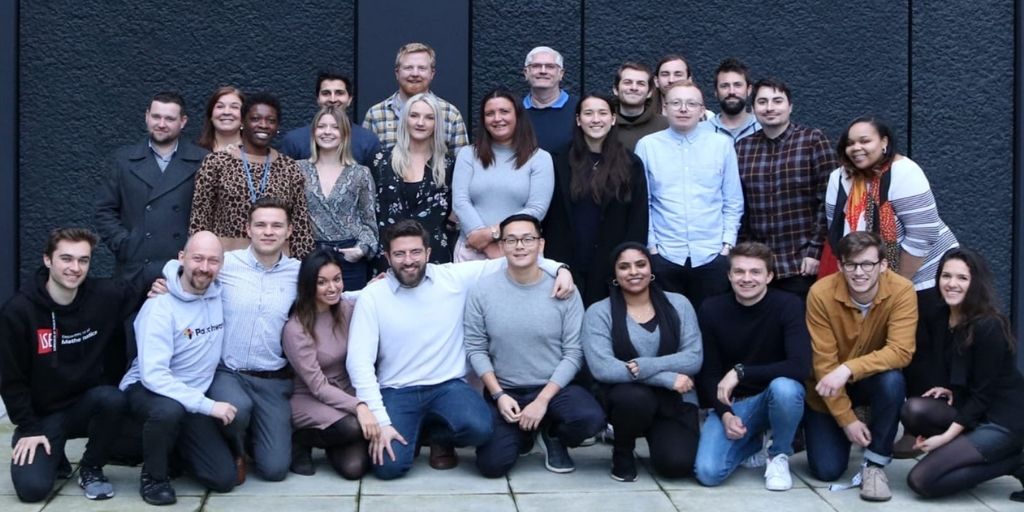
Patchwork Health, the healthcare staffing platform founded by doctors, has raised £3.5m to accelerate their mission to solve the NHS burnout crisis. The funding, from Praetura Ventures and BMJ New Ventures, comes as an NHS workforce ’emergency’ is declared and waiting lists reach record highs.
Founded in 2016 by NHS doctors Anas Nader and Jing Ouyang, Patchwork Health’s workforce technology and services are used by over 70 NHS sites to fill vacant shifts and offer staff flexible working, helping to stem the tide of clinicians leaving the health service due to burnout and poor work-life balance. The NHS currently has 90,000 vacancies and 1 in 5 staff are considering quitting due to rising levels of stress and exhaustion.
Their services have so far enabled over 1.7 million hours of NHS shifts to be sustainably staffed and saved the NHS an estimated £21 million in temporary staffing fees.
The funding round was led by Patchwork’s long-term investment partners Praetura Ventures and BMJ New Ventures – the investment arm of BMJ (global healthcare knowledge provider and publisher of The BMJ). Both have backed the business for several years and are committed to continuing their support as Patchwork grows.
Empowering staff to work in new ways
Patchwork’s technology and services transform what it means to work for the NHS for both full-time and temporary staff.
Currently, many NHS Trusts use spreadsheets or outdated systems to manage their complex rota systems. Typically, this means full-time staff get a few weeks’ notice of their shift patterns, with individuals having little to no control over the hours or days they work. If a staff member is unwell or a ward is understaffed, NHS teams have to manually contact temporary staff or resort to costly locum recruitment agencies to fill the gaps.
Patchwork replaces this rigid, analogue staffing infrastructure with modern, intuitive workforce systems.
To manage temporary staffing (known as the ‘staff bank’), healthcare teams use a Patchwork dashboard and access to bespoke data to predict when temporary staff will be needed, with shifts then broadcast to an app. Temporary staff use the app to select the shifts which suit them. The passporting of credentials, HR paperwork, and payments are all handled through the same system, reducing admin for teams, increasing the number of shifts healthcare organisations are able to fill directly, and enabling temporary staff to work across different sites easily.
For full-time healthcare workers, Patchwork’s smart staffing solutions make it possible for individuals’ personal preferences to be reflected in their rotas without leaving NHS wards with staffing gaps, meaning flexible working can become a reality for all staff.
NHS organisations using the Patchwork technology see staff retention and happiness improve: reducing staff shortages, improving outcomes for patients, and reducing reliance on external recruitment agencies which currently cost the NHS £2.6 billion each year.
Enabling NHS collaboration
Patchwork has also pioneered the use of “collaborative staff banks” across the UK. This initiative brings together multiple primary or secondary care sites across a region to create a shared pool of temporary staff. This means clinicians can work where they are most needed, rather than be tied to one site. Their credentials are automatically and compliantly ported between hospitals through the Patchwork system, with payment and admin processes also automated.
During the pandemic, a Patchwork-powered COVID-19 staff bank for doctors in North West London saw 14 local hospitals (including Chelsea Westminster and Imperial) create a shared pool of staff to cover absences and respond to peaks in demand.
Since then, a range of collaborative staff banks have become permanent fixtures across the UK. This includes the largest collaborative staff bank in the country, after Patchwork brought together over 18 NHS Trusts and 6,000 doctors in the North West of England.
Dr Anas Nader, who co-founded Patchwork Health with Dr Jing Ouyang after they both witnessed the impact of staffing inefficiencies first-hand as NHS doctors, says;
“The NHS is facing a workforce crisis. Burnout is at record levels and more staff are planning to leave than ever before. And the systems which manage the NHS workforce are exacerbating the problem. As a doctor, I know how frustrating it is to feel like a number on a spreadsheet rather than a human being with a life outside of work – it’s a key driver in pushing people out of the healthcare profession. If we’re reaching burnout, we have two options: put up with it or quit. Our technology and services are making a different, better way possible.
“We’re already partnering with over 70 NHS sites to tackle the root causes of burnout, offer full-time and temporary staff more choices, and create stronger staffing foundations for hospitals. Through our technology and services, flexible work and safely staffed wards can go hand in hand. We’re so grateful to our NHS partners, and to the teams at Praetura Ventures and BMJ New Ventures, for making this possible and enabling us to scale up our services at a time of critical need.”
David Foreman, Managing Director at Praetura Ventures and Non-Executive Director of Patchwork, added;
“We’re delighted to be supporting the Patchwork team. From the moment we met Anas and Jing, we could see the passion for their business. Patchwork is helping to solve a staffing crisis in the NHS. They’ve made real strides over the last 18 months and have the potential to make seismic changes in the way we organise staff in one of the world’s largest healthcare systems. At a time when there’s so much pressure on the frontline, innovative platforms like Patchwork will help us shape a better future for this critical industry whilst continuing to maintain high levels of patient care. Everyone at Praetura Ventures is excited to help Patchwork build something that’s going to benefit so many people.”
Anca Babor, BMJ’s Strategy Director, said:
“We are excited to continue to support Patchwork Health in their next stage of growth – it’s a testament to the great progress the team is making and the strong partnership we have built together. A recent editorial in The BMJ argued that improving staff health and wellbeing is far from being a “nice to have,” it is a moral, social, and economic priority. Patchwork plays an important role in achieving this goal, and we are proud to be part of their journey towards a transparent, fair, and efficient workforce planning system that will ultimately improve patient care and create a healthier world.











